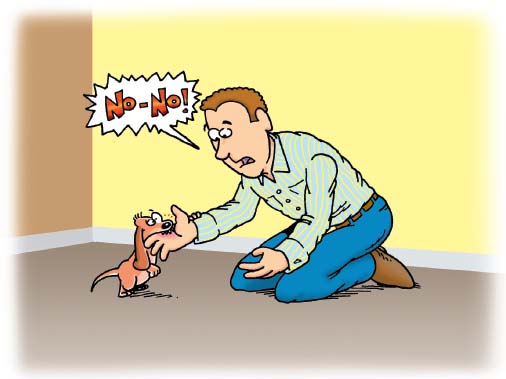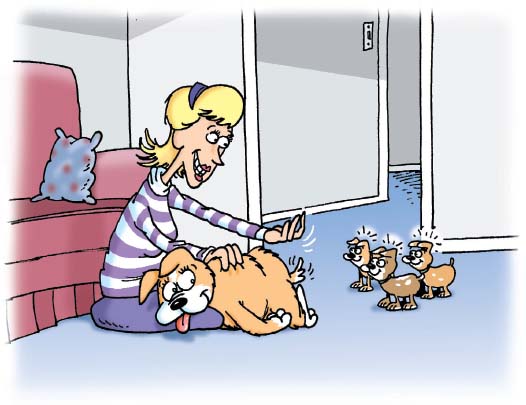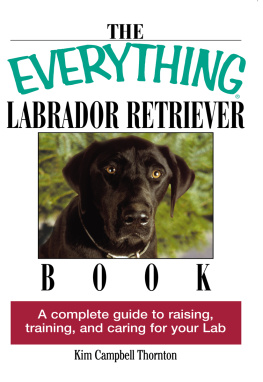Karla Austin, Business Operations Manager
Nick Clemente, Special Consultant
Kendra Strey, Project Editor
Honey Winters, Design
Cover and book design concept by Michael V. Capozzi
Copyright 2006 by I-5 Press
Illustrations copyright 2006 by Buck Jones
The dogs in this book are referred to as he and she in alternating chapters.
All rights reserved. No part of this book may be reproduced, stored in a retrieval system, or transmitted in any form or by any means, electronic, mechanical, photocopying, recording, or otherwise, without the prior written permission of I-5 Press, except for the inclusion of brief quotations in an acknowledged review.
Library of Congress Cataloging-in-Publication Data
Thornton, Kim Campbell.
Socialization / by Kim Campbell Thornton ; illustrations by Buck Jones.
p. cm. (Simple solutions)
ISBN 1-931993-78-5
eISBN 978-1-620080-77-1
1. DogsTraining. 2. DogsSocial aspects. I. Title. II. Series: Simple solutions (Irvine, Calif.)
SF431.T5346 2006
636.7088'7dc22
2006002804
I-5 Press
A Division of I-5 Publishing, LLC
3 Burroughs
Irvine, California 92618
Printed and bound in Singapore
10 9 8 7 6 5 4 3 2 1
Contents
What Is Socialization?
Dogs are known as mans best friend, but they dont come ready-made to take on this role. If theyre to become accustomed to life with people, dogs need to be exposed to peoples touch, sight, and sounds; this begins with proper socialization at birth. Socialization is the process of training a dog to live in a social environmentone that includes people, other dogs, and other animals such as cats or horses. Dogs are naturally social animals. Wild dogs live in packs that are similar to human families: they have a male leader (alpha male), a female leader (alpha female), and other pack members who fall under the alphas in the hierarchy. Alphas lead hunts, produce offspring, and decide where the pack lives.

Generally, domestic dogs no longer live in true packs, except during puppyhood when they learn the basics of being a dog from their interactions with their mother and their littermates. When puppies go to live with their new families, they must learn their place in the human pack. Introducing puppies to human sound and touch during their various developmental stages helps the pups to recognize people as leaders as well as to understand human body language and vocal tones. This is the key to teaching them what they need to know to have fulfilling home lives.

Its important for us to understand a dogs social needs and the stages of canine emotional development in order to properly socialize a dog. The time between the newborn stage and the adult stage is full of change. In the following chapter, we will take a look at these various developmental periods.
Puppy Life Stages
Dogs go through five stages of emotional development: newborn (neonatal), transition, socialization, adolescent (juvenile), and adult.
Pretty much all newborn puppies do is eat and sleep. For their first two weeks of life, puppies are blind and deaf. They dont move much, except to find their mothers milk-producing nipple.
In the transitional third week, the eyes open, the ears become functional, and baby teeth emerge. Puppies in this transitional period are capable of learning. For example, they learn to associate certain behaviors with food rewards and pain with avoidance.

The socialization stage, which begins after the transitional third week and lasts through twelve weeks of age, is the time of greatest influence on puppies. Through play with their littermates, puppies develop physical coordination, learn pack hierarchy, and quickly come to find that biting too hard is a no-no. This is the time to introduce puppies to household and outdoor sounds and objects as well as to make introductions to new people, such as the veterinarian and potential puppy buyers. For these reasons, many breeders keep puppies with their littermates until theyre at least twelve weeks old. Puppies still sleep a lot, but theres a change in their brain wave activity while theyre awake. The brain waves become much greater in amplitude, likely a result of the new abilities of sight and hearing. During this stage, puppies learn to run, bark, wag their tails, and make different facial expressions using their ears and lips to communicate.
Even after the traditional end of the socialization period at twelve weeks, puppies continue to learn. Now is not the time to slack off on socialization. You want to teach your puppy as many good habits as possible before adolescence kicks in. The adolescent (juvenile) stage lasts from six months of age through two years of age. Your adolescent dog has an I wanna be in charge attitude just as much as a human teenager has. Early socialization teaches the dog youre the boss, which will help alleviate your frustration during this period.

Dogs reach adulthood by two years. If youve done your part to provide proper socialization and training, youll end up with a well-behaved pet.
During all of these stages, beginning at birth, its essential for puppies to be talked to and handled by people. The breeder is the first person to teach puppies what people are like, so this role is crucial to proper socialization.

The Breeders Role
Does it really matter where or from whom you get a dog? Absolutely! The benefits of purchasing a puppy from a reputable breeder extend beyond health certifications and the opportunity to evaluate the litters parents for temperament and appearance. A good breeder makes a concerted effort to start socialization at birth. She handles the pups every day, orienting them to household goings-on, so they can transition to their new homes with confidence. Puppies raised with little human contact are shy and less confident about new situations, making them difficult to handle and train.


During their first month of life, puppies are most influenced by their mother and littermates, but human handling is still important. A puppys first encounter with human touch is when the pup is born. The breeder picks the puppy up to clean it off, determine whether its a boy or a girl, check that the puppy is whole and healthy, and place a piece of colored rickrack around the neck for identification.
Several times a day, a breeder handles the newborn pups to weigh them, ensure theyre doing well, or give them a snuggle. The breeder also watches the puppies mother (dam) to see how she reacts to people. If she welcomes human touch and lets people handle her babies, the pups will be accepting of human attention.
Next page





















